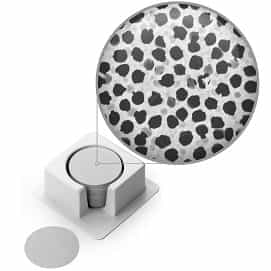
Sterlitech is proud to announce the availability of Aluminum Oxide (Al2O3) inorganic microporous membrane filters. These filters are finding use in several specialty applications, ranging from nanomaterials synthesis (where they perform best), graphene synthesis (Buckypaper) and testing, HPLC mobile phase filtering, liposome filtering, environmental monitoring, and more! The Sterlitech alumina membranes are also a suitable alternative to Whatman Anodisc© filters.
These anodized alumina filters are distinguished by swift filtration speed owing to their high pore density, efficient separation, and high purity. The inorganic material is constructed of numerous, narrowly distributed pores in the form of honeycombs yielding a high degree of open space.
Adding to their features, these membranes become almost completely transparent when wet, and display minimal auto-fluorescence, making them well-suited for epifluorescent light microscopy. As particles are retained on the smooth surface, the alumina membrane is eminently suitable for microscopic analyses. The material is not cytotoxic and also offers a good surface substrate for cell culture applications. Aluminum oxide does not contain organic extractable components and displays only minimum adsorption. Pore sizes available are 0.02 µm, 0.1 µm, or 0.2 µm.
For more background on the unique properties of this inorganic filter, please contact at technical representative at Sterlitech Corporation at 1-877-544-4420 or [email protected] to learn more.


![Join Sterlitech at BIO 2024 [Booth #5558]: Exploring the Future of Biotechnology](https://www.sterlitech.com/media/magefan_blog/b4.jpeg)

